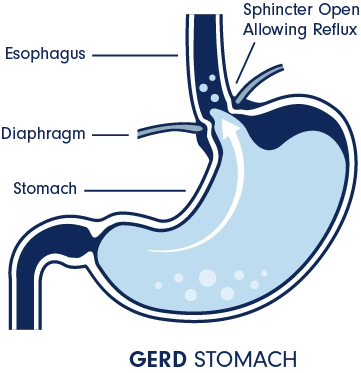Understanding Heartburn
While heartburn is a relatively common condition, it can be long-lasting, uncomfortable, and difficult to treat with over the counter options.
Understanding Heartburn
While heartburn is a relatively common condition, it can be long-lasting, uncomfortable, and difficult to treat with over the counter options.

What Is Heartburn?
Heartburn, despite its name, is not an affliction of the actual heart. Rather, heartburn is primarily a disorder of the esophagus, which is located near the heart but is part of the digestive system. The esophagus carries food from your mouth to your stomach, and there is a muscle at the bottom, called the lower esophageal sphincter, that opens to allow food and drink into the stomach and then closes when you are done swallowing. Heartburn occurs when this muscle is weakened, which allows stomach acid to back up into the esophagus. This reflux of stomach acid causes the burning sensation of heartburn.
Frequent heartburn or acid reflux are symptoms of a potentially damaging disease called Gastroesophageal Reflux Disease (GERD). Dr. Doucette and the team use their knowledge in the latest developments for treating GERD to create relief from heartburn for their patients.
What Causes Heartburn?
Heartburn can be caused or aggravated by a number of lifestyle factors, including:
Certain Foods Common heartburn triggers include red wine, chocolate, citrus fruits, garlic, onions, tomatoes, spicy foods, and carbonated beverages.
Obesity A body mass index (BMI) over 25 can increase the chances of chronic heartburn.
Smoking can damage the tissues around the esophagus and impair esophageal muscle function.
Hiatal Hernia A hiatal hernia is a type of hernia that allows abdominal contents to push through the diaphragm.

What is GERD?
Gastroesophageal Reflux Disease (GERD) is a condition that stems from increasing or chronic heartburn and acid reflux symptoms. GERD is a painful and chronic disease which can precede esophageal cancer, so it is crucial it is treated before it progresses. Our practice offers several effective treatments for GERD. GERD can be caused by a weakened and malfunctioning Lower Esophageal Sphincter (LES), which is a muscle that closes off the esophagus from the stomach. When it is functioning normally the LES closes after swallowing, which blocks stomach acid from going up into the esophagus. When the LES malfunctions, it allows stomach acid and food back up into the esophagus causing pain and even esophageal damage. In some cases, a hiatal hernia causes acid reflux which can also lead to GERD.

Symptoms of GERD
GERD presents itself as heartburn and acid reflux symptoms, including any of the following:
- Continual heartburn
- Difficulty eating and/or swallowing
- Acid erosion on teeth
- Chronic cough or asthma
- Nighttime cough
- Regurgitation
- Chest pain

Is it Heartburn or Gastroesophageal Reflux Disease (GERD)?
If your frequent heartburn is severe enough that it prevents you from sleeping or causes difficulty eating, then it may be a sign of Gastroesophageal Reflux Disease (GERD). GERD is a chronic condition that causes severe acid reflux and heartburn symptoms, and can cause more serious medical issues if left untreated.
Schedule Your Heartburn Consultation
If you have been diagnosed with GERD, hiatal hernia, or if you are suffering from chronic heartburn or acid reflux, schedule a consultation with Dr. Doucette. He works with each patient to create a personalized plan for treating and ending heartburn.
Dr. Darrell Doucette has either authored or reviewed and approved this content.
Page Updated: